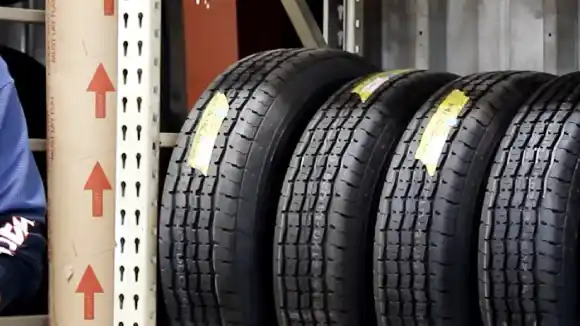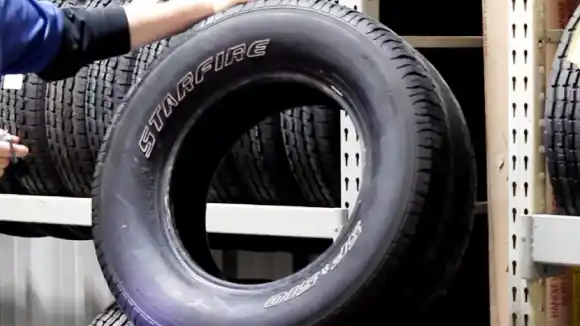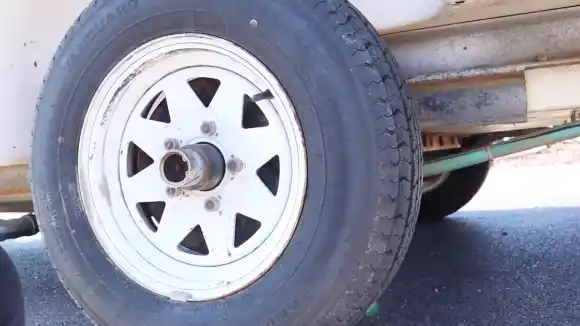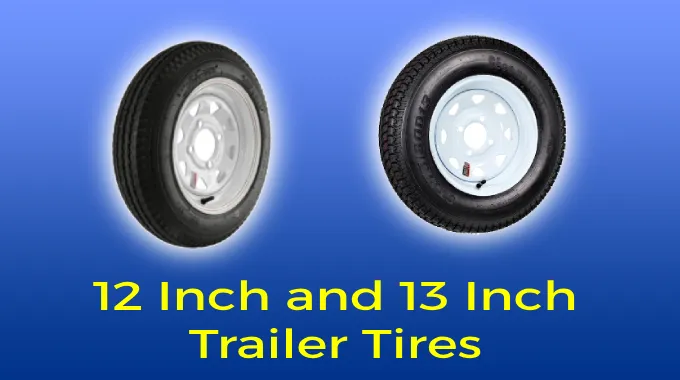Last Updated on July 26, 2023
Ensuring the safety and stability of your trailer needs the right tires. Before making a choice, you must understand the distinctions between 12 and 13 inch trailer tires. But what sets these two tire sizes apart?
The tread patterns and grip of the tires may differ, with 13 inch tires often offering better traction and stability. Another important difference is the load capacity, as 13 inch tires can typically handle more weight than their 12 inch counterparts.
Today we’ll explore the subtle differences between the 12 inch and 13 inch varieties. We’ll also uncover the mystery behind why trailer tires seem to wear out so quickly and more. So buckle up and get ready to find out everything you need to know about 12 inch and 13 inch trailer tires.
Differences Between 12 Inch and 13 Inch Trailer Tires

If you’re wondering about the differences between 12 inch and 13-inch tires for your trailer, there are several key points to consider.
- Size and Compatibility
- Tread Patterns and Grip
- Load Capacity Differences
- Durability and Lifespan
- Tire Pressure Requirements
- Handling and Stability
- Speed Limitations
- Impact on Fuel Economy
- Impact on Towing Capacity
- Availability and Cost
Size and Compatibility
Although it may seem like a bummer, smaller trailer tires, like the 13-inch ones, might need to be compatible with larger trailers. This is because the size of the trailer tire is directly related to the trailer’s weight capacity.
Here are some key things to consider when it comes to compatibility:
- Trailer Height: Smaller tires can affect the overall height of the trailer. If your trailer requires a specific ground clearance, there may be better options than using smaller tires.
- Wheel Diameter: Smaller tires have a smaller wheel diameter, which can impact the overall stability and handling of the trailer. It’s essential to ensure the wheel diameter matches the trailer’s requirements.
Tread Patterns and Grip
One important consideration is the grip and tread patterns of different trailer tire sizes and their compatibility with specific trailers.
Regarding trailer tires, tread patterns are crucial for traction and grip on various surfaces. The tread patterns are designed to channel water away from the tire, reducing the risk of hydroplaning and improving traction in wet conditions.
Also, the tread patterns help to distribute weight evenly across the tire, ensuring better stability and control while towing. Different trailer tire sizes may have varying tread patterns, each designed to optimize performance for specific trailer types and towing applications.
Choosing a tire size with a tread pattern that suits your specific towing needs, whether for off-road adventures or highway hauling is important.
Load Capacity Differences
The load capacity of different trailer tire sizes can vary significantly, impacting the overall performance and safety of your towing experience. Understanding the load capacity differences between inch and 13-inch trailer tires is important before deciding.
Here are two key points to consider:
- Weight rating: 12 Inch trailer tires typically have a lower weight rating than 13-inch tires. This means they can carry less weight, limiting your towing capabilities.
- Load distribution: 13-inch trailer tires have a wider footprint, allowing for better load distribution. This helps distribute the weight evenly across the tire surface, reducing the risk of uneven wear and improving towing stability.
Durability and Lifespan
You’ll be pleased to know that durability and lifespan are important factors to consider when choosing the right size of tires for your trailer.
Regarding 13-inch trailer tires, they’re generally known to have a longer lifespan than their smaller counterparts. The larger size allows for a greater load capacity, which means less strain on the tires and ultimately results in a longer lifespan.
Also, 13-inch tires are typically made with stronger materials and thicker sidewalls, enhancing durability. This added strength and durability help the tires withstand the demands of towing heavy loads and navigating rough terrains.
Tire Pressure Requirements
Contrary to popular belief, ensuring the proper tire pressure is crucial for the longevity and performance of your trailer’s rubber companions. Neglecting this aspect could lead to premature wear, reduced fuel efficiency, and tire blowouts.
To maintain optimal tire pressure, consider the following:
- Regularly check the tire pressure using a reliable gauge, as it tends to decrease over time.
- Refer to the manufacturer’s guidelines for the recommended pressure range, typically indicated on the tire sidewall or in the owner’s manual.
- Adjust the tire pressure according to the load you’re carrying. Heavier loads may require higher pressure to ensure better weight distribution and stability.
- Avoid overinflating the tires, as this can result in a harsher ride and an increased risk of tread damage.
Handling and Stability

Maintaining proper handling and stability of your trailer is crucial for a smooth and worry-free towing experience. Regarding inch and 13-inch trailer tires, there are a few key factors to consider.
Firstly, the size of the tire plays a significant role in the overall stability of your trailer. Larger tires provide better stability and handling compared to smaller ones.
The tire’s tread pattern is also important for maintaining traction on various road surfaces. Choosing a tire with a tread pattern that suits your towing needs is recommended.
Lastly, the tire pressure should be regularly checked and maintained at the recommended level. Proper tire pressure ensures optimal handling and stability while prolonging the tire’s lifespan.
Speed Limitations
To ensure a smooth and worry-free towing experience, it’s important to be mindful of the suggested pace limitations while on the road. Regarding speed, it’s crucial to adhere to the guidelines set by the trailer tire manufacturer.
Generally, most 13-inch trailer tires have a maximum speed rating of 65 miles per hour. The tire’s construction and design determine this rating, and exceeding it can result in decreased handling and stability. Higher speeds can generate excessive heat, potentially leading to tire failure or blowouts.
Additionally, driving at higher speeds can cause increased wear and tear on the tires, shortening their lifespan. Therefore, driving at a safe and appropriate speed is essential to ensure the longevity and performance of your trailer tires.
Impact on Fuel Economy
Boost your gas mileage with these simple tips to minimize the impact on your fuel economy while towing. Regarding the size of your trailer tires, opting for smaller-inch tires can help improve your fuel efficiency.
This is because smaller tires have less rolling resistance, so your engine doesn’t have to work as hard to move the trailer. Additionally, smaller tires are generally lighter, reducing the strain on your vehicle’s engine.
By choosing 13 inch trailer tires instead of larger options, you can potentially save on fuel costs in the long run. However, ensure that the smaller tires are still appropriate for your trailer’s weight and load capacity.
Impact on Towing Capacity
When it comes to towing, you’ll want to ensure you know the impact on your vehicle’s towing capacity. The size of your trailer tires, such as 12 inch or 13 inch, can affect how much weight your vehicle can safely tow.
Generally, larger tires have a higher towing capacity because they provide more stability and support. This is because they have a larger contact patch with the road, which helps distribute the trailer’s weight more evenly.
On the other hand, smaller tires may have a lower towing capacity because they have a smaller contact patch and may not be able to handle as much weight.
Availability and Cost
The availability and cost of larger tires can significantly impact your towing experience. There are various sizes for trailer tires, including inch and 13 inch options. The availability of these tires may vary depending on your location and the specific tire brand you prefer.
It’s also important to consider the cost of these tires, as they can vary greatly. While inch tires may be more readily available and generally cheaper, 13 inch tires can provide better stability and handling.
However, they may be harder to find and have a higher price tag. It’s crucial to balance availability, cost, and performance when selecting the right tire for your trailer, ensuring a smooth and safe towing experience.
Can a 13 inch trailer tire replace a 12 inch trailer tire?
Replacing a 12-inch trailer tire with a 13-inch trailer tire may provide a better balance and broader base for your vehicle. The larger diameter of the 13-inch tire allows for greater ground clearance, reducing the risk of scraping your trailer’s underside or fender.
Furthermore, the width of the 13-inch tire (typically 7-8 inches) compared to the widest 12-inch tire (around 5.5 inches) offers improved stability and handling while towing.
Here are three key advantages of using a 13-inch trailer tire:
- Enhanced ground clearance: With the tire sitting 1.1-1.95 inches closer to your trailer, you can easily navigate uneven terrain, preventing damage to the underside or fender.
- Increased stability: The width of the 13-inch tire provides a broader base, reducing the risk of swaying or fishing while towing.
- Improved load capacity: 13-inch tires typically have a higher load rating than their 12-inch counterparts, allowing you to safely carry heavier loads.
By upgrading to a 13-inch trailer tire, you can enjoy these benefits and ensure a smoother and safer towing experience.
How fast can you drive a trailer with 12 inch tires?
To maximize your towing speed, you can confidently pull a trailer with 12-inch tires up to their impressive 65 mph rating. These tires are specifically designed to withstand the demands of towing and are built to provide stability and durability at high speeds.
It’s important to note that exceeding the recommended speed limit can compromise the performance and safety of your trailer.
The 12-inch tires we carry have undergone rigorous testing to ensure they can handle the stress of towing at speeds up to 65 mph. They’re constructed with strong materials and feature a tread design that enhances traction and control.
How fast can you pull a trailer with 13 inch tires?

13-inch trailer tires are rated for up to 81 MPH, making them a reliable choice for towing. These tires are designed to withstand the demands of highway driving and provide stability and control while you’re on the move.
With their sturdy construction and high-speed rating, you can confidently travel at highway speeds, knowing your trailer tires can handle the load.
Whether you’re embarking on a long-distance journey or simply need to get from point A to point B quickly, 13-inch trailer tires will help you reach your destination safely and efficiently.
How much weight can a 12-trailer tire hold?
You’ll be amazed at the weight capacity of a 12″ trailer tire, allowing you to confidently haul heavy loads while experiencing the freedom of the open road.
These 12″ trailer tires have a 4-ply rating and can hold a maximum capacity of 780 lbs. They are designed to withstand a maximum PSI of 60 lbs, providing stability and durability for your trailer.
Whether transporting equipment, materials, or even livestock, you can trust that these tires will support the weight and keep you safe on your journey.
Why do trailer tires wear so fast?
Trailer tires can wear out quickly due to improper tire pressure, overloading, and misalignment. These issues can significantly impact the lifespan of your trailer tires, leading to premature wear and tear. Here are three main reasons why trailer tires wear out so fast:
- Improper tire pressure: Riding with the wrong tire pressure can cause uneven wear on the tires, leading to a shorter lifespan. Underinflation puts excessive stress on the sidewalls, while over-inflation can cause the center of the tire to wear out quickly.
- Overloading: Exceeding the load capacity of your trailer tires puts tremendous strain on them. This can result in accelerated wear, as the tires aren’t designed to handle excessive weight.
- Misalignment: Trailer misalignment or bent wheels, often caused by hitting curbs, potholes, or debris, can lead to uneven tire wear. When the wheels aren’t properly aligned, certain areas of the tires bear more weight, causing them to wear out faster.
Protect Your Trailer: Choose the Right Tire Size for Your Vehicle
After exploring the differences between 12-inch and 13-inch trailer tires, you may wonder if you can swap out one. The answer is yes, but before you do, consider the potential impact on your trailer’s performance.
12-inch tires can only handle speeds up to a certain limit, whereas 13-inch tires can handle higher speeds. Also, the weight capacity of a 12-inch tire is determined by its specific rating and load-carrying capabilities.Trailer tires are prone to wear and tear due to underinflation, overloading, and lack of maintenance. To prevent potential tire-related mishaps, keep an eye on your tires and give them the attention they deserve because a stitch in time saves nine.



